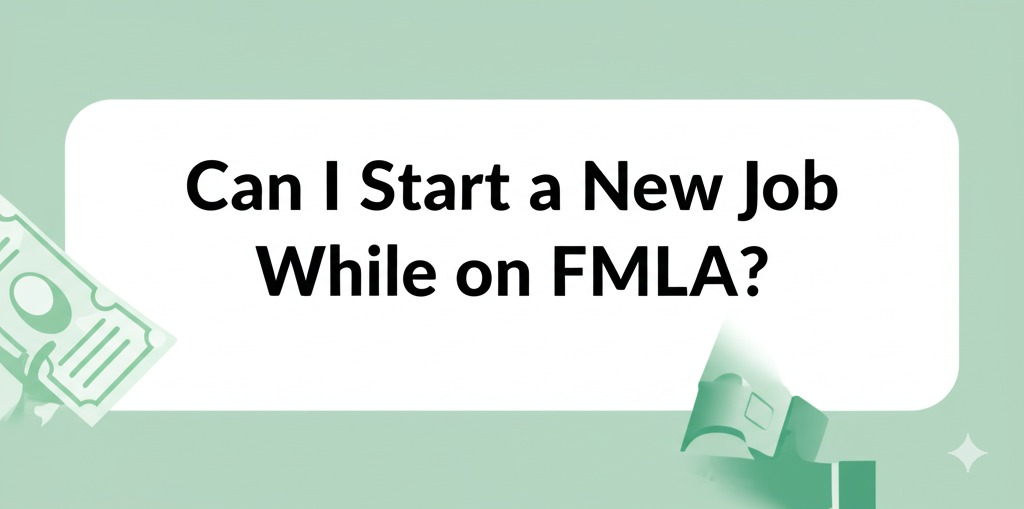
Taking time off from work under the Family and Medical Leave Act (FMLA) is a significant decision. Whether you’re managing a personal health issue, caring for a family member, or dealing with another qualifying condition, you may wonder if it’s possible to start a new job while on FMLA leave. This article explores the legalities, risks, and considerations involved in starting a new job while on FMLA leave, helping you make an informed decision.
What is FMLA Leave?
Understanding FMLA Leave
FMLA provides eligible employees with up to 12 weeks of unpaid leave per year to manage personal health conditions or care for a family member with serious health issues. The leave is job-protected, meaning you are entitled to return to your same or an equivalent position after your leave ends. However, FMLA comes with strict guidelines on what activities are permitted during your leave.
Key Aspects of FMLA Leave:
- Eligibility: You must have worked for your employer for at least 12 months and have worked at least 1,250 hours in the past year.
- Covered Reasons for Leave: Includes your serious health condition, caring for a family member, or dealing with specific military family situations.
- Duration of Leave: Up to 12 weeks within a 12-month period.
FMLA leave ensures that employees can take time off without the fear of losing their job, but it does not come without its constraints.
Can You Start a New Job While on FMLA?
The Legal Implications of Starting a New Job
When you’re on FMLA leave, you’re expected to focus on the purpose for which the leave was granted. If you’re using FMLA for a personal health issue, the law assumes that you’re unable to work for your current employer. Therefore, starting a new job during FMLA leave could present a violation of the law, depending on your circumstances.
Violating FMLA Terms:
- Job Protection Risk: If you take a new job while on FMLA leave, you may jeopardize your job protection rights. Your current employer could argue that you’re not taking leave for its intended purpose, which may lead to termination.
- Legal Ramifications: Starting a new job while on FMLA leave can be considered a misuse of the leave, and in some cases, employers could take legal action or report the violation to the U.S. Department of Labor.
When Can Starting a New Job Be Allowed?
In certain cases, if your FMLA leave is based on something like personal health issues (and you’re deemed well enough to start another job), it may be possible, but it’s risky. For example, if your health condition improves significantly and you’re no longer in need of leave, you may be able to return to work or consider a new job, but it’s always important to consult with legal counsel or HR professionals before making that move.
Considerations Before Accepting a New Job While on FMLA
Review Your FMLA Status
Before you even think about starting a new job, it’s essential to check your FMLA leave status. Ensure you understand the terms of your leave and whether it’s possible to legally take on another position without repercussions. If your current employer finds out, this could lead to complications.
Impact on Your Benefits
If you start a new job while on FMLA leave, consider the following:
- Health Insurance: If your new job offers benefits, how will that impact your current coverage under your existing employer’s health plan?
- Retirement and Benefits Contributions: Starting a new job might affect your contributions to retirement savings or other benefits that are typically covered during FMLA leave.
Employer Policies
Employers may have specific rules regarding working for other companies while on leave. It’s crucial to understand your employer’s policies on outside employment during FMLA. Violating these policies could result in disciplinary action or termination.
The Risk of Losing Your Job
While FMLA offers job protection, it does not prevent employers from terminating employees for other valid reasons. If your employer believes you’re no longer focused on the health condition that warranted the leave, they may decide to terminate your position.
What Are the Alternatives?
Consider Transitioning from FMLA Leave to a New Job
If you’ve reached the end of your FMLA leave and you’re ready to transition to a new job, the most straightforward approach is to formally resign and begin the job search. This ensures you aren’t violating any legal terms tied to your FMLA leave.
Take Temporary or Part-Time Work
If you’re unable to work full-time due to your condition but can manage part-time work, discuss the possibility of reducing your hours or taking a temporary role with your current employer. This may be a way to bridge the gap between leaving your old job and starting a new one.
Conclusion
Starting a new job while on FMLA leave is fraught with legal and ethical considerations. The risks to your current employment, job protection, and legal standing make it a decision that should be carefully evaluated. Before making any decisions, it’s crucial to review your FMLA leave terms, consult with your HR department, or seek legal advice.
If you’re contemplating a career change or new opportunity, consider waiting until your FMLA leave concludes, or explore alternatives that align with both your health and professional goals. Always prioritize transparency and legality when navigating employment matters during leave.

Andre Cuevas provides career insights, job search strategies, and professional advice to help individuals navigate the job market and achieve their career goals.





